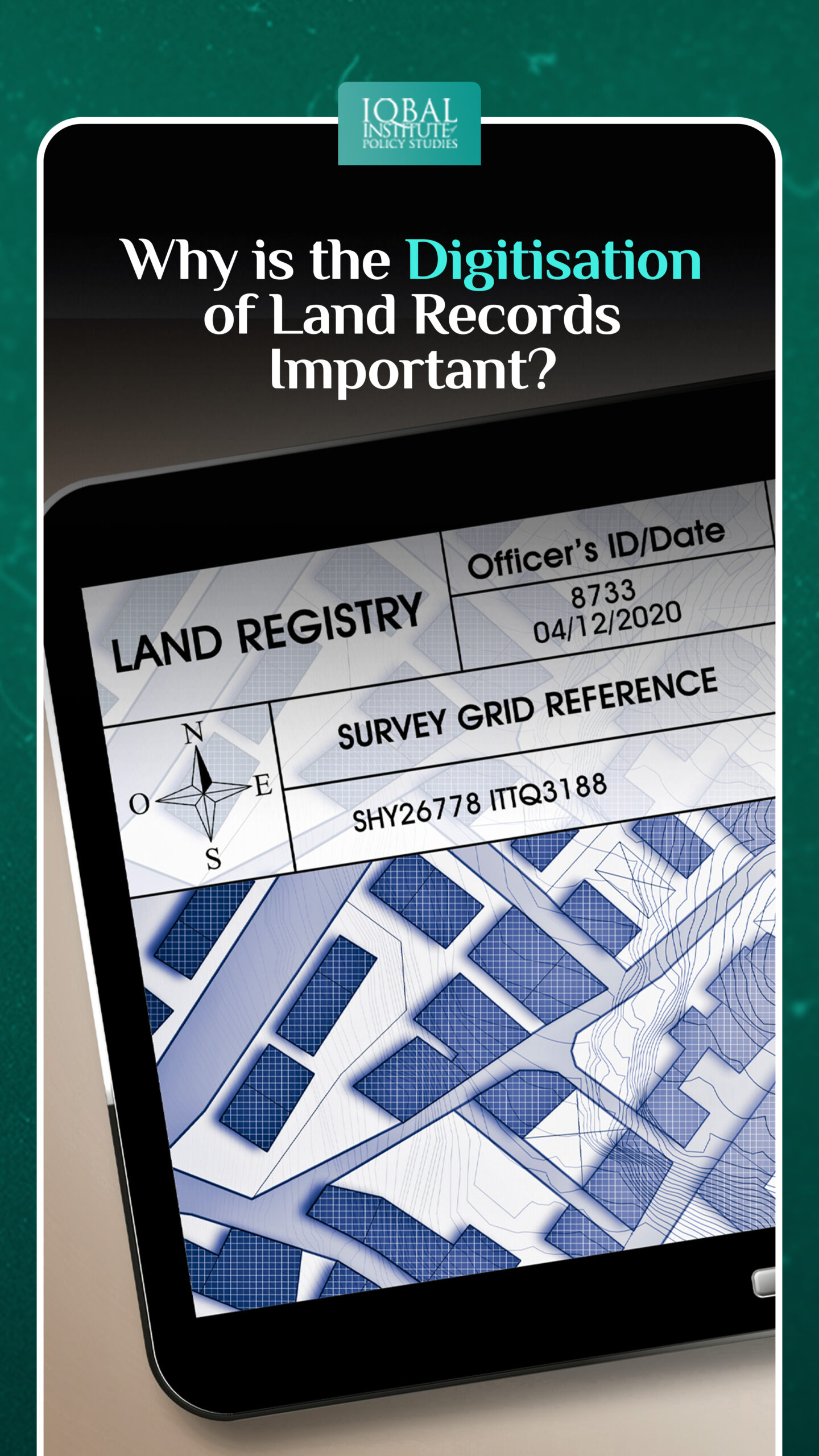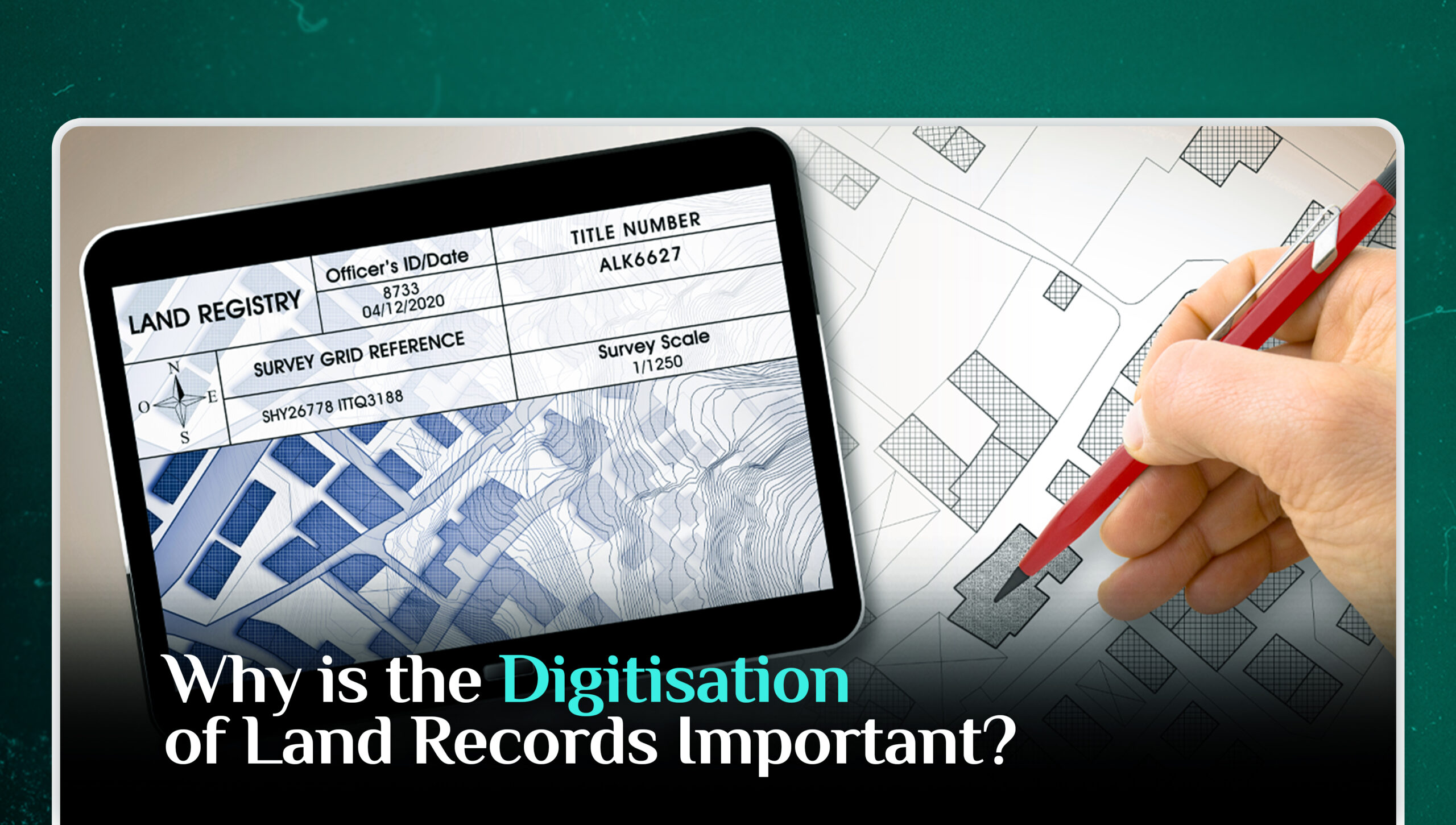Digitalization has taken the world by storm, forcing a digital transition in business and governmental organizations. The traditional issues of record keeping, storage, and maintenance made it crucial to go paperless; including in the land sector which was prone to malpractices, tampering, and corruption. The land is considered a prominent, valuable, and rare asset of any nation. It evaluates wealth, status, and power and is necessary for a country’s productivity and developmental activities. Therefore maintaining digital land records is crucial for both the state and the individual. From the state’s standpoint, computerized land records are significant in driving transparent revenue in the form of taxes and critical for modern infrastructure planning and development. From an individual’s outlook, digital land records help identify legal ownership from the comforts of home, act as a piece of evidence, and protect it from land grabbers. In simple words, digital land records narrate and reflect the history and rightful ownership of land through a cost-effective and quick process. Moreover, digital land records reduce issues of boundary disputes, easement rights, mortgages, and foreclosures. Therefore, automation of the land record system is essential for digital transformation to keep up with the fast pace digital world.
Land Records Issues in Pakistan
The land management and administration system of Pakistan is similar to the one practised in the Mughal era. As a result land disputes, tampering, illegal land grabbing, and land conflicts are not new to the country. Even in the 21st century, the country has failed to fully digitalize its system leading to increasing issues of lack of transparency and accountability. Approximately 190 million land records of around 50 million landowners are managed manually through traditional methods in Pakistan (Shabbir, Shahid, Atif, & Niaz, 2020). Moreover, 60% to 70% of court cases in the country are related to land ownership (BR Research, 2021). The Board of Revenue institution, which is responsible for legally maintaining land records in Pakistan has around 14000 patwaris or village accountants as their junior officers (Shabbir, Shahid, Atif, & Niaz, 2020). Most of the changes or tampering of the original land records regarding its legal ownership, use, and taxation by these patwaris go unchecked due to the manual system. This increases access to fraudulent land documents and inconsistency in the quality of local documents in Pakistan. The citizens have a hard time acquiring their land and sometimes it takes years to prove ownership in courts. For example, it can take two decades to solve a normal civil case, and the completion of the trial perhaps can take another half a decade for the execution of the decree (Bari, 2018). Furthermore, land transactions are a costly affair, and conflicts about the legalities of land ownership are a result of inefficient and dispersed land record systems. The recent digital land survey highlighted that the total value of all encroached state land and those in the three major cities of Islamabad, Karachi, and Lahore stood at approximately Rs5.5 trillion, and Rs2.63trillion respectively (DAWN, 2021) Therefore, complete digitalization of land records in all regions is crucial for Pakistan. It will help track the undeclared assets in the country and also reinforce the trust of local and foreign investors by providing maximum security and transparency in the system.
Benefits of Digitalization of Land Records
Convenience in Accessibility
Digitalization of land records allows convenience and ease in finding, searching, and retrieving information. Land files are not lost which was a common thing in traditional manual record keeping. Moreover, organizations and individuals from around the world can track and trace land records from their computers or mobile phones, which can save time and increase productivity.
Cost Efficient
Manual and traditional land records utilize a lot of resources and a huge amount of money is spent on papers, management, space, and storage costs. By converting paper-based land records to electronic documents, the tedious burden of record maintenance and management will be reduced and it will make the whole process cost-effective. Moreover, unnecessary printing of documents is replaced with an email to acquire data. This ultimately saves natural resources as well.
Provides Security
Traditional land records are prone to tempering and illegal changes and are vulnerable to land mafia and false documents. On the other hand, digital land records assure maximum cyber security and save the land from malpractices of corruption, bribery, and data loss. Where physical documents can get damaged or lost, digitalization provides safe record keeping which is more secure and easy to replicate.
Aids in Administration
The Land is one of the main assets of the government which generates revenue. Thus, the digitalization of land records will help in administration by calculating the total revenue, tracking illegal assets, and collecting overall taxes. Moreover, the government can identify cultivable land, barren land, agricultural and residential land, etc., which can be used effectively for future developmental projects. Planned and unplanned areas will also be distinguished leading to better policies and future planning.
Identifies the Rightful Owner
7 out of 10 people around the world are deprived of land registration systems that give them legal and clear ownership of land (The World Bank, 2017). Moreover, land ownership is highly condensed and feudal lords obturate any effective reforms, policies, or systems towards the rightful distribution of land. For example, 1489,235 acres of land are illegally occupied by powerful persons in the country (Tunio, 2022). Therefore, the digitization of land records will determine the rightful owner and lessen the number of land-related cases in the country. Moreover, it will also help the government identify land grabbers and illegal land occupants.
Increases Productivity
Digital land records save time, improve the buying, selling, and transaction processes, and maximize productivity. For example, it takes only 50 minutes to complete a property transaction task through a digital system which otherwise would take 2 months via a manual record system (The World Bank, 2017). It elevates the process and functioning of regulatory systems by providing efficient client services and user interaction. Moreover, all records are regularly updated and archived for future use.
Increases Investments
Digital land records increase transparency and accountability which may reinforce trust and confidence in buyers, sellers, and investors. It will also reduce corruption within the system which can attract foreign and local investments. This will boost the real estate sector of the country and strengthen the economy. Today, multiple real estate companies in Pakistan provide transparent and digitalized land records and property listings. For example, PropSure provides the services of online property verification and inspection which can help prospective clients during the buying and selling of property (propsure, 2022).
The Way Forward
The government should work with the real estate sector to digitally map the entire land of Pakistan to highlight planned, unplanned, encroached, or illegally occupied land.
Digital documentation of all land owners, buyers, sellers, and investors by a regulatory authority and ease in the availability of specific land records and data on the online government portal must be ensured.
The government should formulate and implement effective policies and laws that build the state and governing bodies’ capacity to retrieve illegally occupied land from land mafias.
Services of online property records are restricted to the provinces of Punjab and Sindh only. The government must invest in establishing a regulatory authority that digitalizes all regions and ensures easy access to land records of every area within the country.
A standardized geographical and demographic information system should be built with the help of digital maps and utilized to develop a digital land information system that shall meet the needs of landowners, district administrators, state-level departments for land administration, and the Central government.
Conclusion
Digitalization of land records can save the state and individuals from all the hassle. It can increase land value and empower women, poor farmers, and individuals whose land rights are vulnerable and unprotected in the traditional system. Therefore Pakistan must digitally transform the way it manages land records. It will not only lessen multiple land-related challenges and malpractices in the country but also increase productivity and ensure economic prosperity.
This article is written by Haneen Gul. Haneen is a Research Analyst at the Iqbal Institute of Policy Studies (IIPS).
References
Bari, O. M. (2018). DELAYED JUSTICE AND ITS IMPACT ON HUMAN RIGHTS IN PAKISTAN. III. Retrieved from https://humanrightsreviewpakistan.wordpress.com/volume-iii/delayed-justice-and-its-impact-on-human-rights-in-pakistan/
BR Research. (2021, March 26). Business Recorder. Retrieved from https://www.brecorder.com/news/40077715
DAWN. (2021, November 21). Retrieved from https://www.dawn.com/news/1659393
prop sure. (2022). Retrieved from https://propsure.com.pk/
Shabbir, M., Shahid, M., Atif, M., & Niaz, U. (2020, June). Land Record Computerization brings more Trouble for Farmers in Punjab Pakistan. Journal of Business and Social Review in Emerging Economies, 6(2). doi:https://doi.org/10.26710/jbsee.v6i2.1216
The World Bank. (2017, September 20). Retrieved from https://www.worldbank.org/en/news/feature/2017/09/20/in-pakistan-and-beyond-land-records-get-a-digital-upgrade
Tunio, H. (2022, August 30). The Express Tribune. Retrieved from https://tribune.com.pk/story/1852900/149235-acres-forest-land-illegal-occupation



Leave a Reply